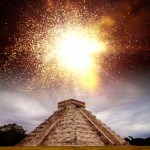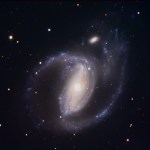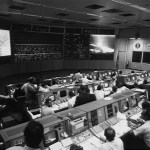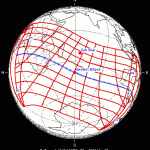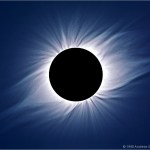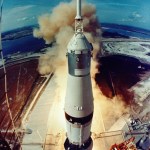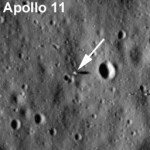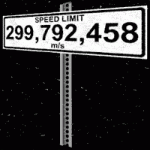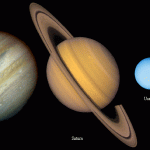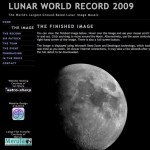
After just finishing my series on the last 100 years in astrophysics, I was surprised to read an article in Bust Magazine that seems like it ought to be from 100 years ago.
You see, 100 years ago, segregating boys and girls was commonplace in schools. Not only that, but girls took "girl classes" like home economics, while boys took "boy classes" like trigonometry. One would think that we're past that by now.
One would hope so.
But clearly, this isn't true everywhere. The Mobile, Alabama county school system went way over the line starting last fall (2008). From the ACLU's site:
Without…
Doomsday in 2012? Please, I don't even have time for that. (Check out Ian O'Neill's work for a nail-in-the-coffin of those myths.) But there is a big milestone that we will reach right around 2012.
Prior to the industrial revolution, the Earth's atmosphere was really ideal for supporting the wide diversity of life on the planet. Breaking it up into its physical, molecular contents, the atmosphere, weighing in at just over 5,100 trillion tonnes (5.1 x 1018 kilograms), was made up of the following elements (by mass, not volume):
Nitrogen gas (N2): 3,890 trillion tonnes (around 75.5%),
Oxygen…
I'm not responsible for this one, though! Head on over to Steinn's page, Dynamics of Cats to see this week's Carnival of Space in full. Sure, I wrapped up my series on the last 100 years, but you'll want to take a look at my top 3 from this week's Carnival:
1. Chandra's 10th anniversary: it was a big deal when Chandra went up on the Moon landing's 30th anniversary, and so don't forget to celebrate our great X-ray observatory's greatest discoveries, including the first incontrovertible evidence for dark matter!
2. Jupiter struck by something! Asteroid? Comet? ALIEN? Just what was it that…
There is so much good music out there that never, ever hits the mainstream. But if you dig a little bit, you can not only find some good ones, occasionally you hit the gold mine. Such is the case with The Bridge, a Baltimore-based band that I'll almost definitely come see September 5th when they come through Portland. Take a listen to one of my favorite jams of theirs, Jeremiah Jones:
And you know what's something I've never posted as a Weekend Diversion before, somehow? A poem. So, I present to you O Captain! My Captain! by Walt Whitman, a beautifully sad one written just after the…
Recently, I expressed an opinion on this site in favor of a manned mission to Mars. I was met with many comments -- both positive and negative -- discussing this position. So I'd like to, first off, find out what your opinions on it are:
I realize that there are many other deciding factors on whether you think the answer should be yes or no, but I'd like you to pick the closest one.
For me, a combination of the first and third reasons are why I am compelled to say yes. This is important, because I freely admit that I believe the scientific merits of a manned mission to Mars are very…
Battle not with monsters, lest ye become a monster. And if you gaze long into the abyss, the abyss also gazes into you. --F. Nietzsche
That's supposed to be a metaphor, right? Not so, says NGC 1097. In visible light, it just looks like a barred spiral galaxy:
But damn if the abyss isn't gazing back at us in the infrared. From the Spitzer Space Telescope:
Universe Today has the full story on what we're seeing. You're going to have to go there; apparently, I have a monster to battle.
The last 100 years have brought us from a Universe no bigger than the Milky Way ruled by Newton's gravity to a vast, expanding one with hundreds of billions of galaxies, covered in dark matter, beginning with the big bang, which was likely caused by inflation, and which will end in a freezing cold death as the galaxies accelerate away from one another, off into infinity. We gained and confirmed a new theory of gravity; we learned how all the elements in the Universe were made. We detected neutrinos from an exploding star hundreds of thousands of light years away. And we walked on the Moon.…
Although many of the best sites for eclipse viewing -- such as Shanghai, China -- were clouded out during this early morning, an old high school friend of mine in Taiwan had a chance to view an outstanding partial solar eclipse, which is something that most of us will get to see in our lifetimes.
While a total eclipse is typically only visible in a small region on Earth (where the blue swath is, above), a partial eclipse covers a much larger area (everywhere covered in red), where the Moon partially passes in front of the Sun.
When I was 15, I got to experience an 88% partial eclipse. With…
That's right, the absolute best eclipse of our lifetimes is going to occur tomorrow! First off, total Solar Eclipses are rare enough, and spectacular when they happen.
After all, a total solar eclipse allowed us to first test Einstein's General Relativity! A total Solar Eclipse happens when the Moon passes directly in between the Earth and the Sun, casting a shadow on the Earth.
This only happens rarely, for three reasons. First off, the Moon's orbit is not in the same plane as the Earth and the Sun. The Moon's orbit is inclined by about 5 degrees to the plane that the Earth orbits the Sun…
As many of you know, I am raising money and volunteer time for charity by shaving my head. Yes, I'm nervous about it, and yes, I'm definitely going to do it once we get 100 donors. If you'd like to donate, some fantastic charities that I can recommend are:
Heifer International: providing livestock and training in poor areas around the world, helping people to lift themselves out of poverty, while requiring them to, in turn, train others and donate some of the animals' offspring.
Kiva: providing no-interest loans to entrepreneurs in impoverished areas, allowing them to lift themselves out of…
Today: July 20th, 2009. The 40th anniversary of the Apollo 11 moon landing. The very first time mankind walked on the Moon. From liftoff,
to walking down the lunar landing module for the first time,
to some of the most iconic images in all of human history:
It brings up a sense of wonder unlike any other before. This video by the onion is so funny to me because it really does capture that sense of awesomeness, and just how blown away those twelve men who got to walk on the Moon must have been:
And it's 40 years later now. While, scientifically, we understand more about outer space, the…
I was driving to work one day this past week, thinking about how to make some positive change in this world, while this song -- Lochs of Dread -- by Béla Fleck was playing:
And a great idea hit me. You see, all over my town, small, local, community-based non-profit organizations (such as museums, libraries, hospitals, parks, etc.) are facing huge shortages, both financially and in terms of workers. I give a little bit of money to charity, and I volunteer a couple of times a month at my local science museum on the weekends, but that's really all I can do.
Until now. You see, I believe that if…
Understanding the Universe requires a lot more than just knowing some advanced mathematics, and even more than knowing how to apply that math. It requires a knowledge of natural history, and an understanding of the requirements for allowing that history to happen.
In other words, the laws of nature must be such that the Universe can exist as it does. Seems like a very simple, innocuous, and self-evident statement. Yet in this simplicity, we can learn a few important things about the Universe. Reasoning, using this statement, is often referred to as the anthropic principle.
There is more…
I'll keep this simple, as you can get longer writeups at Universe Today, Bad Astronomy, and the NASA site, but a NASA spacecraft currently orbiting the Moon just released images of five of the six Apollo landing sites.
Why am I so excited about this? Because you can see the Earth-junk we left there! There's the lunar module from Apollo 11:
the one from Apollo 14 (Apollo 12 was out of the way, and Apollo 13 -- of course -- never made it onto the Moon):
and from Apollo 15:
Apollo 16:
and Apollo 17:
Go back to Apollo 14. There's something spectacular that you can see on the Moon in that…
By the 1990s, we knew an awful lot about the Universe. You can check out what the greatest discoveries were (in my opinion) from the 1910s, 1920s, 1930s, 1940s, 1950s, 1960s, 1970s, and 1980s. By this point, we understood the origin of the Universe as well as we understand it today, knew about dark matter and normal matter, and were trying to figure out what the fate of the Universe was. It started with a bang (of course), with a supremely hot (~10^20 degrees), dense, and rapidly expanding state (image courtesy of Stephen van Vuuren):
We knew that there were (and are) two things going on,…
In the wake of the release of Unscientific America, a lot of discussion has ensued as to how scientifically literate we are, how scientifically literate we need to be, and what to do about science education in America. There are a lot of interesting perspectives out there, and I'd like to synthesize a few of the most important ones for you.
1. Journalists: There are some excellent science writers and journalists out there. (Miles O'Brien was one of my favorites.) There are also some horrendous ones, as Jessica Palmer helped reveal, who I would go as far as to call sensationalistic, lying…
The coolest things about science are often at the frontiers. We love to press the limits of nature: to cool things down as close as possible to absolute zero, to raise energies as high as possible, and to speed them up as fast as possible. But when it comes to speed, there's an absolute limit: the speed of light in vacuum.
Relativity tells us why this is the absolute limit: the faster you want to go, the more energy it takes. But, as you get close to the speed of light, you effectively increase the mass of your speedy particle, which makes it ever harder to accelerate it. In fact, it would…
It's time for an easy weekend for everyone. To kick it off, here's a song that almost everyone knows of, by the Eagles. Only, the Eagles didn't write it. Jackson Browne was screwing around in his flat with this song that "wasn't quite done" according to him. He played it for Glen Frey, and was stumped after the line "standin' on a corner in Winslow, Arizona, such a fine sight to see." The Eagles' contribution to the song was:
It's a girl, my lord,
in a flatbed Ford
slowin' down to have a look at me.
That's right; Take it Easy is a Jackson Browne song. (And, incidentally, Winslow, Arizona was…
The inner Solar System is a pretty bizarre place. Think about the giant planets in our Solar System -- the Jovian planets -- that weigh in from tens to hundreds the mass of Earth.
These giant balls of gas are orbited by all sorts of interesting things, from moons so giant that they have their own substantial atmospheres like Saturn's Titan:
to captured Kuiper Belt objects, like Neptune's giant moon, Triton:
to regular natural satellites that formed around the giant planets as they formed, such as Saturn's Dione and Enceladus:
All told, if we look at all the moons in the Solar System, the…
This is the coolest thing online I've seen in a long time. A team of amateur astronomers took over 1000 pictures of tiny areas of the Moon. 288 of them were chosen and mosaiced together. They describe the result far better than I do:
The end result is a high resolution 87.4 megapixel image of the Moon, larger even then previous images taken by some of the world's largest observatories, allowing features as small as 1km to be clearly seen.
This is the world's record for the largest mosaic of the Moon ever made, and it's available for you to view in full detail (!) at their site, Lunar World…

